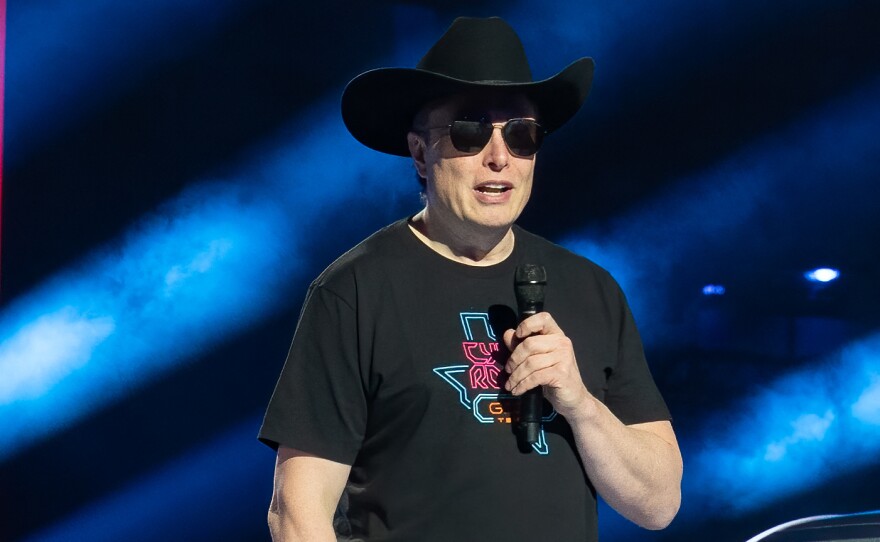Updated April 14, 2022 at 9:55 PM ET
Twitter CEO Parag Agrawal is trying to assuage employee fears in the wake of Elon Musk launching a hostile $43 billion takeover attempt of the social media company.
At an all-staff meeting on Thursday, Agrawal said Twitter's board is considering Musk's offer and will act in the best interest of company shareholders, according to two employees in attendance.
When an employee suggested that Musk's aggressive acquisition bid felt like a hostage situation, Agrawal dismissed the notion.
"I don't believe we are being held hostage," Agrawal shot back, according to the employees.
After the meeting, many were dismayed, saying they feel like they were being left in the dark about what was really going on and that a Musk-owned Twitter represents, to some, a nightmare scenario, given Musk's long history as a volatile business leader.
"The culture here and this platform deserves to be protected, and I hope the Board does the brave thing and refuses the offer," said one Twitter employee who requested anonymity. "Our democracy is more important than a payout," this employee said. "I hope the Board agrees."
But this Twitter worker added: "It does feel like there isn't much we can do as employees," this person said.
Musk revealed his interest in purchasing Twitter earlier in the day by tweeting a filing to the Securities and Exchange Commission stating the acquisition depended on the "completion of anticipated financing."

That was unusual, analysts noted, because an investor eyeing a takeover typically discloses financing along with a bid.
"I'm not sure that I will actually be able to acquire it," Musk said at the TED2022 conference in Vancouver, British Columbia, which was his first appearance since making his Twitter purchase public.
When asked if there was a "Plan B," if his takeover failed, he said "there is," but he refused to provide further detail.
Musk's bid could attract other potential Twitter buyers
Musk's offer of $54.20 per share is 38% more than the value of Twitter stock the day before his investment was publicly announced and 18.2% higher than Wednesday's closing price.
"It would be utterly indefensible not to put this offer to a shareholder vote," Musk tweeted on Thursday afternoon. "They own the company, not the board of directors."
Twitter stock closed down 1.35% on Thursday, well below Musk's offer price, however, suggesting investors may be skeptical of the billionaire's bid.
Prince Alwaleed bin Talal of Saudi Arabia, a longtime Twitter shareholder, tweeted on Thursday that Musk's offer doesn't come close to the company's "intrinsic value" and said he would reject it. Musk responded on Twitter by asking: "What are the Kingdom's views on journalistic freedom of speech?"
Interesting. Just two questions, if I may.
— Elon Musk (@elonmusk) April 14, 2022
How much of Twitter does the Kingdom own, directly & indirectly?
What are the Kingdom’s views on journalistic freedom of speech?
But Musk's approach may open the door to other interested buyers who have their own designs on Twitter, said Scott Kessler, an analyst at research firm Third Bridge.
"This is really perhaps the beginning of a process, and it's not necessarily going to start and end with Elon Musk," Kessler said.
However, analyst Dan Ives of Wedbush Securities wrote in a note to clients that he expects Musk to succeed.
"It would be hard for any other bidders/consortium to emerge and the Twitter board will be forced likely to accept this bid and/or run an active process to sell Twitter," Ives said.
Still, there are unanswered questions, including how Musk would balance his time given that he is already CEO of Tesla and SpaceX, and how he would finance his cash offer. Most of his $266 billion net worth is held in Tesla shares. Selling part of his stake could affect Tesla's valuation.
From Twitter's most vocal user to would-be owner
The takeover bid is the latest twist in a wild two weeks for the billionaire and the social media platform.
On April 4, Musk disclosed he'd been buying up Twitter shares and had become its largest individual shareholder. (Earlier this week, a Twitter shareholder filed a securities fraud lawsuit against Musk, alleging his late disclosure of his stake cost investors money and saved Musk around $143 million.)
The Tesla CEO is both a prolific user of Twitter and a vocal critic, so his investment immediately sparked questions about his intentions. In the weeks before his stake became public, he had publicly questioned Twitter's commitment to free speech and mused about creating his own rival social network.
The next day, Twitter CEO Agrawal announced Musk would join the company's board — and had agreed to limit how much more Twitter stock he could buy. Both men said they looked forward to working together on the company's future.
But those plans quickly fell apart. Over the weekend, Musk notified Twitter he would not join the board after all, a decision that Agrawal described as "for the best."
Before his about-face became public on Sunday night, Musk had spent much of the weekend tweeting suggestions, criticisms and jokes about Twitter. "Is Twitter dying?" he asked in one tweet, noting that many of its most-followed users, such as Barack Obama and Katy Perry, rarely tweet.
Musk is a self-described free-speech absolutist
While it's not clear why Musk changed his mind about joining the board, in his filing on Thursday, he doubled down on his vision of Twitter's role in society — and what is needed to realize it.
"I invested in Twitter as I believe in its potential to be the platform for free speech around the globe, and I believe free speech is a societal imperative for a functioning democracy," he wrote in a letter to Twitter chairman Bret Taylor. "However, since making my investment I now realize the company will neither thrive nor serve this societal imperative in its current form."
Musk has described himself as a "free speech absolutist" and has been critical of Twitter's rules about what people are allowed to say on the site.
Among Musk's other proposals for Twitter include cracking open the "black box" of the social platform's algorithm so there is more transparency around what tweets get promoted or demoted. That automated process being secret, he said at the TED event, is "quite dangerous."
"I don't like to lose": Musk
But Twitter, which has far fewer users compared to social networks like Facebook and TikTok, is also under pressure to grow its business. Changing its policies against content such as hate speech and false claims about COVID could be a turn-off for users and advertisers.
"This is a moneymaking platform where your ideas are amplified if they're going to help the company make money," said Karen Kornbluh of the German Marshall Fund, who studies online disinformation.
"When you poll people, people say they want moderation, that they don't want conspiracy theories floating freely on their platforms, that they don't want harassment," she said. "So I think it's a misunderstanding of what people want."
At the TED conference on Thursday, Musk said his interest in Twitter was not about economics or making money. "Twitter has become kind of the de facto town square," he said. "So it's just really important that people have both the reality and the perception that they are able to speak freely within the bounds of the law."
He added: "I don't like to lose."
Copyright 2022 NPR. To see more, visit https://www.npr.org. 9(MDAzMjM2NDYzMDEyMzc1Njk5NjAxNzY3OQ001))









